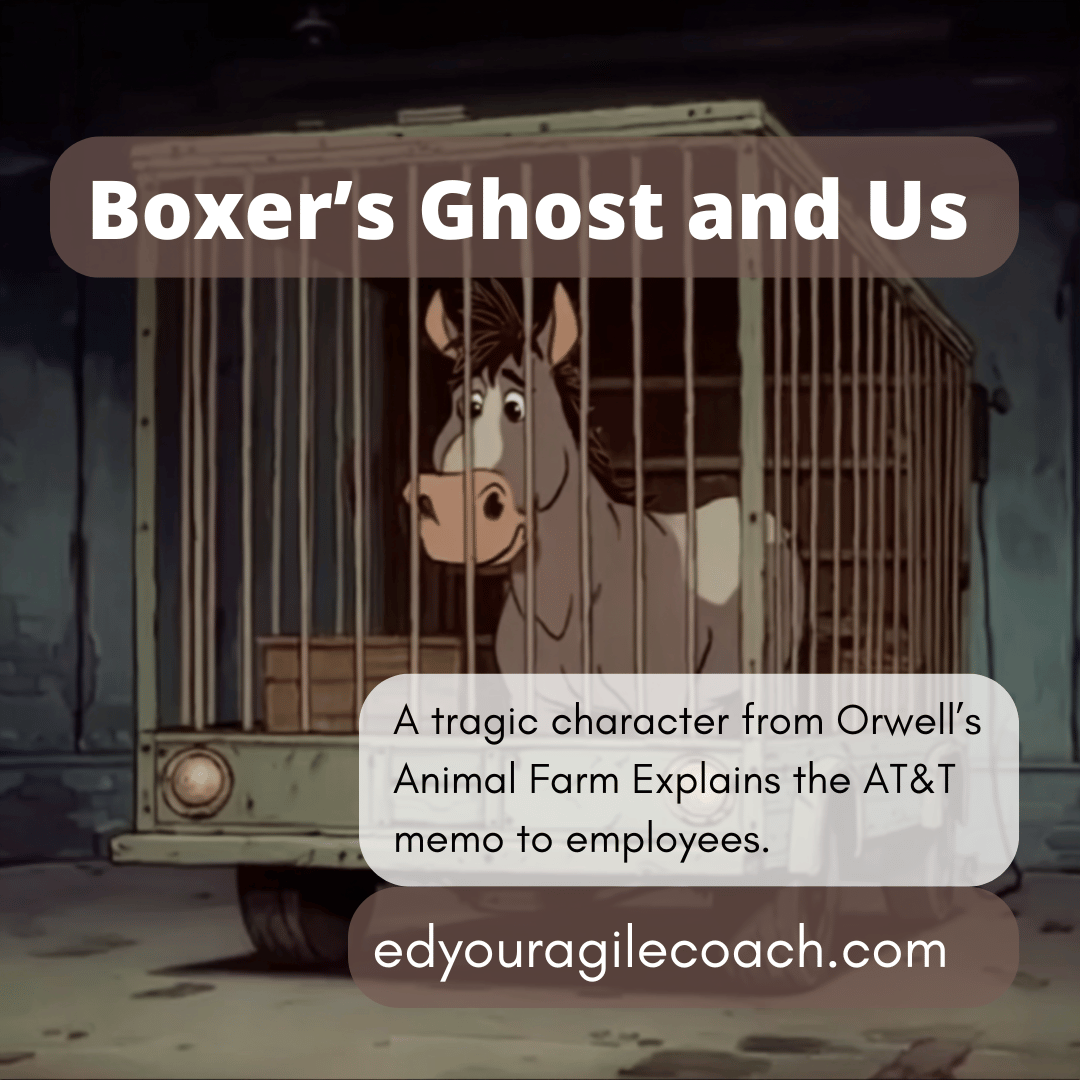Boxer's Ghost Haunts the Boardroom

One of the most tragic characters from twentieth-century literature is a warning about our current business culture. In George Orwell's "Animal Farm," a horse named Boxer is a hero of the animal revolution against the human farmers. Boxer is stoic and hard-working until he injures his hoof. The pigs who manage the farm repay the horse's service by shipping them off to a glue factory to be slaughtered and collect the profit from the sale for themselves. As the truck drives him away, Boxer wails in despair, realizing the betrayal. Orwell highlighted the amorality and ruthlessness of communist revolutionaries, but he could easily be describing modern CEOs. I have been thinking about Boxer when news surfaced of AT&T's CEO and his memo to employees about customer satisfaction surveys and return to office mandates.
John Stankey's memo will become the stuff of legend in business schools, just like Milton Friedman's editorial explaining shareholder dominance. It is already being labeled tone deaf and proof that corporate loyalty is dead. From now on, every corporate employee is a mercenary working for the highest bidder, and corporate leadership deserves nothing in return.
Stankey points out in his memo that the employee engagement survey has declined for the second consecutive year. Return-to-office mandates have been a problem at AT&T, with insufficient desks and numerous network connectivity issues, which is ironic because one of AT&T's principal profit centers is broadband internet. Instead of admitting that there might be a morale problem, Stankey says that unhappy employees should leave, and those who stay should expect changes focusing on:
"…a more market-based culture- focused on rewarding capability, contribution, and commitment."
It sounds harmless at first, but what he is saying is that years of experience, family sacrifice, and remaining with the company when they could have gotten a better compensation deal elsewhere are meaningless. The executive leadership team is also judging the capability, contribution, and commitment. He also points out that compensation, benefits, family leave, and mental health care are bound to be scaled back. He states sarcastically:
"I tried to pick my brain for an example of another 100+ year old company that didn't have to disrupt itself to secure sustainable relevance. I am still searching for the first example."
It reminds me of Elon Musk and his memo to X employees when he asked for "hardcore" workers and people who would "ride-or-die" with him. The results speak for themselves with revenues about half of what they were before Elon took over, a wave of layoffs, and a CEO who quit in shame when the AI chatbot at X began spouting neo-nazi talking points. Riding or dying with Elon means the death of your career while you are maintaining Elon's ego and ketamine habit. The other CEOs noticed and decided that servant leadership was too complicated, and becoming hardcore was the answer.
It is not the answer. What Stankey is doing is what Dr. Anna Kallschmidt called enforcing a culture of compliance. Rather than seeking honest feedback, leaders are asking for validation that soothes their egos and confirms their worldviews. Anyone who points out that something needs to change violates that unwritten rule of work that upholds the culture. The falling employee engagement survey is a threat to Stankey's worldview, so he wishes to ignore the data and tell people to work harder. I expected better from someone who graduated from the UCLA MBA program.
I also think this is an example of what Epoch Philosophy calls "spectral capitalism." Employees are behaving like ghosts going through the motions and haunted by business leadership, who are expecting perfect compliance from employees. Meetings exist to create the illusion of work, not to produce results. People coffee badge so they look like they are participating in office culture. People work faster with little passion and no consideration for quality. The only thing that matters is conformity and compliance with arbitrary behavior.
Currently, AT&T shares are trading up 21% in 2025, so Stankey can afford to go hardcore on his employees. However, if the share price declines, I am sure that people will start asking uncomfortable questions about the corporate culture that Stankey advocates. Already, T-Mobile and Verizon recruiters are poaching employees from AT&T. Customer satisfaction is low, and they cannot meet the demand for AT&T wireless broadband in my zip code. Being a business leader is challenging and insecure. Still, I hope that Stankey is rewarded with falling share prices and lower profits because he has decided to go hardcore instead of fixing a broken business culture.
Stankey wants "contribution, trust, and effectiveness," as part of his AT&T transformation. Instead, he is daring the board of directors to ship him off to the glue factory just like Boxer.
Until next time.




Comments ()